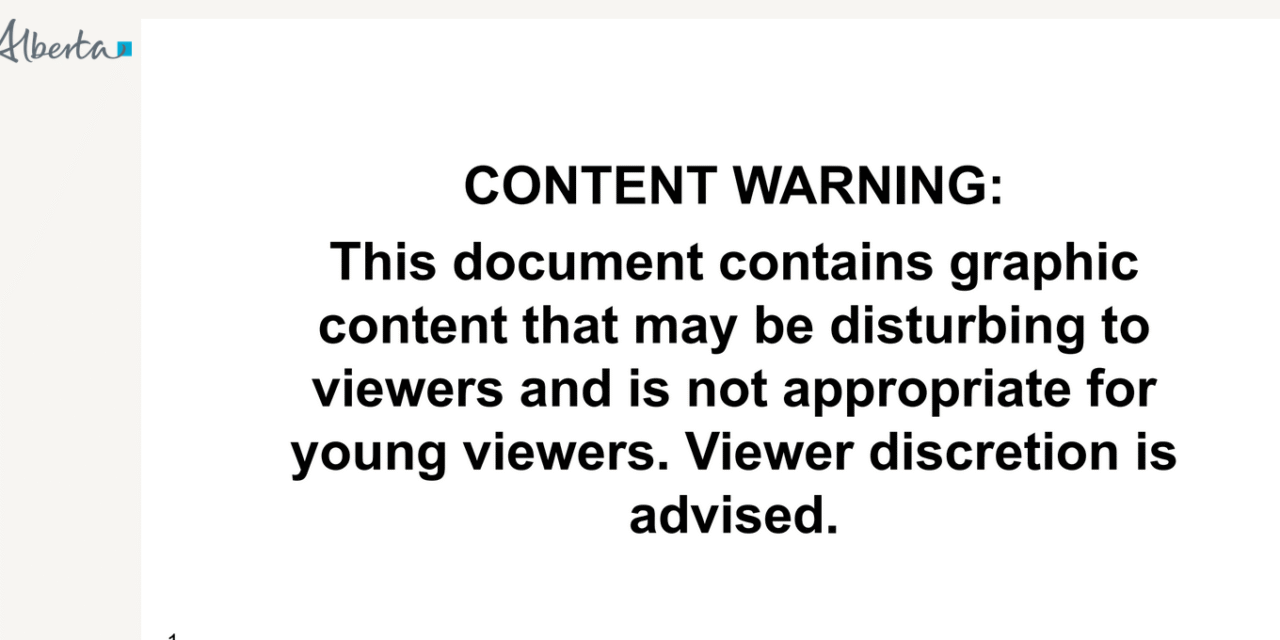The huge shock horror opening warning on the survey link
How Danielle Smith’s government is using shock tactics to mislead Alberta parents
by Mark Morris
The Alberta Government currently has a shock-horror sex campaign on, claiming that four ‘graphic novel’ books with sexual content – all with LGTBQ+ subjects – have been found in elementary school libraries. Well, no, it claimed they have been found in 57 school libraries, without saying which schools at which level, and then claimed they were in elementary libraries (so if the book was found in a K-9 or K-12 school, and may have been restricted to high school children, the Government could still claim they were in elementary schools).
For the survey it has now put on line (survey here) it has put a link to a pdf (apparently a PowerPoint then turned into a pdf) naming the four books, all of which have been the subject of anti-LQBTQ+ banning advocates in the States. For each book it has taken out a couple of quotes with sexual content, and reproduced pages with sexual content from the books. There is no other information whatsoever about the books and their content – they are simply presented in a lurid, voyeuristic, and prurient way by the Government of Alberta.
In the absence of any more concrete information from the government, one can only conclude that it got the names of these books from its US anti-LQBTQ+ campaigner friends, and then either someone went through them to find the most graphic bits, to show the shock horror to the public, or (much more likely) they got the whole thing from a foreign source. It is odd that if you highlight two of the titles, and then paste the titles into Google, you get a hidden subtext in the copied text “Classification: Protected A 4” before the titles. Whose classification? Whose protection?
So what are these four horrific books? I don’t think anyone would claim – especially the authors – that these four books are age appropriate for elementary schools. But junior high and high school is quite a different matter. They were published in 2023, 2006, 2019, and 2020, so none is new. When you actually look at the books a very different picture emerges.
Three are graphic autobiographies, and the fourth semi-autobiographic. Blankets by Craig Thompson gets four stars from 122,380 readers on Goodreads. He wrote it to come out to his evangelical Christian parents that he was no longer Christian. Publishers Weekly (hardly a woke publication) commented: “Thompson manages to explore adolescent social yearnings, the power of young love and the complexities of sexual attraction with a rare combination of sincerity, pictorial lyricism and taste”. These are the prestigious awards it has won: 2004 Harvey Award for Best Artist, 2004 Harvey Awards for Best Cartoonist and Best Graphic Album of Original Work, 2004 Eisner Awards for Best Graphic Album and Best Writer/Artist, 2004 Ignatz Awards for Outstanding Artist and Outstanding Graphic Novel or Collection.
The Australian Classification Review Board of the Australian Government in a judgement of Maia Kobabe’s Gender Queer in April 2025 wrote, explaining its new ‘Unrestricted/M’ classification: “In the Review Board’s opinion, the Unrestricted classification reflects the publication’s literary, artistic, and educational value, with the consumer advice of ‘M – Not recommended for readers under 15 years’ appropriate to protect younger readers, while ensuring that older teens and adults retain access to diverse and important narratives.” Publishers Weekly’s February 2019 review stated that “this heartfelt graphic memoir relates, with sometimes painful honesty, the experience of growing up non-gender-conforming. […] This entertaining memoir-as-guide holds crossover appeal for mature teens (with a note there’s some sexually explicit content) and is sure to spark valuable discussions at home and in classrooms.”
Fun Home by Alison Bechdel has a Goodreads four stars rating from 195,062 readers. The following publications listed it as one of the best books of 2006: the New York Times, Amazon.com, The Times of London, New York magazine, and Publishers Weekly. It won numerous awards, and in 2009, it was listed as one of the best books of the previous decade by The Times of London, Entertainment Weekly and Salon.com. In 2010, the Los Angeles Times literary blog “Jacket Copy” named Fun Home as one of “20 classic works of gay literature”. In 2019, the graphic novel was ranked 33rd on The Guardian’s list of the 100 best books of the 21st century. The publishers themselves suggest a readership of 15 and above.
Mike Curato’s Flamer won widespread praise, and won the Lambda Literary Award for Children’s and Young Adult Literature in 2021. The Horn Book Magazine, the premier publication about children’s and young adult’s books, included it on its list of the best books of 2020, which states that it “winningly captures the joys of camp and young love while at the same time exploring the hopes and fears of the human heart.”
To indicate how mainstream these books actually are educationally, Blankets has an entry on Gradesaver, Gender Queer and Fun Home study guides on SparkNotes, and Flamer a study guide on SuperSummary.
It is all too clear what is happening here: the Alberta Government, prompted by members of the Government and its supporters who are evangelical Christian and anti-LTGBQ+ advocates, and following US leads, is, in the most prurient way, attempting to shock Albertans without giving any of the context, to set the stage of eradicating LGTBQ+ acknowledgment or discussion from Alberta’s education systems.
They have disguised this by saying all they are doing is “considering new standards that would establish consistent requirements for school boards in selecting material for their school library collections.”
Yes, these four book should not be available to elementary school children. But Junior High or High School is a different matter, unless, of course, you want to deny young adults any information on sex and sexual experience, as seems to be the goal of this Government. Hardly a sensible idea when when all children can so easily access extreme sexual material on the web, without the moderation that a good education system, with good libraries and librarians and teachers, provides.


